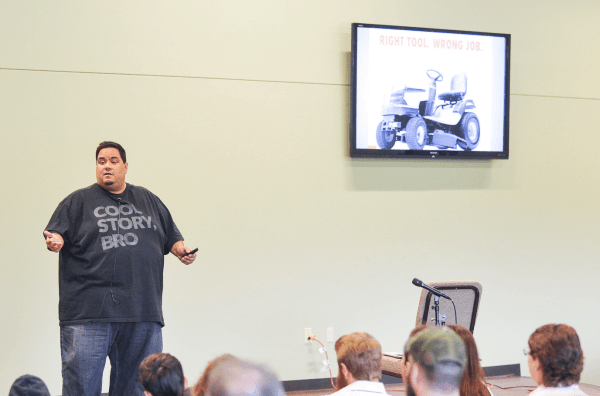I go to a lot of conferences. Some of them are the really big expensive kind where you have presenters who are being paid massive amounts of money to speak, and others are small affairs with volunteer speakers.
But regardless of how much I spend, or how big the event is, or how much the speaker is paid – almost every presenter does the same thing: they get started too quickly.
Were you trained like this?
Maybe you were taught that the first few minutes of your presentation is when you articulate your own expertise. The logic is that after a couple of minutes people will be so impressed that they'll listen to you.
Maybe you were taught that the first few minutes is when you tell a joke, to lighten the mode and to help you get calm and comfortable. The logic is that if you're calm, and your audience is calm, everyone will have a good time.
Maybe you were taught to share the agenda and help manage people's expectations. The logic is that if people know what they're getting into, they'll be more ready for it.
Unfortunately, I find that these strategies have mixed results.
People have questions
Here's what I've discovered – see if it's the same for you.
The first five minutes is when the people in your audience are asking these questions:
- Does this person “get” me?
- Do they have any experience that could help me right away?
- Are they interesting? Are they a jerk?
- Should I switch to another session?
As you can see, these questions aren't answered by an agenda, or joke. And the “talk all about my expertise” approach may just leave others thinking you're a jerk.
Your first five minutes…
How do I spend the first five minutes? I tell a story. A true story. With detail.
And its intention is to help my audience determine if they're in the right place. It helps them determine if I “get” them, and if there's anything I might have to share that is worth them staying for.
So do I share a story of success where I demonstrate how amazing I am? No. Quite the opposite.
In graphic detail I highlight a situation where I've failed. Hopefully bigger than my audience has. In that articulation of failure, three things happen.
First, it's funny. How can you not laugh at someone who has really blown it. I mean – crazy insane blown it. So you laugh.
Second, it's connecting. Right away the audience starts thinking, “I've been there…”
Third, it's compelling. After all, if this guy is willing to start there, I just have to know what's next.
So take your time…
So as you prepare for your next presentation, take your time. Tell your story. Misery loves company. Make it fun and watch how many people connect to your story long before they want to connect to your facts.
My talk from WordCamp Austin isn't live yet, but when it get's posted, I'll update this post so you can see if my failure story would have kept you in the room.

